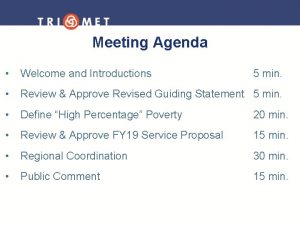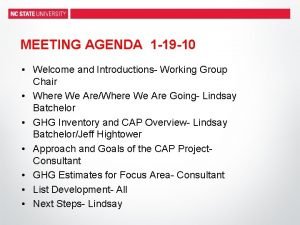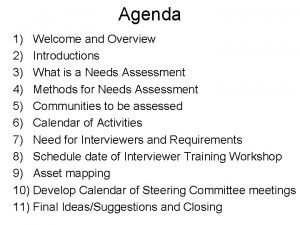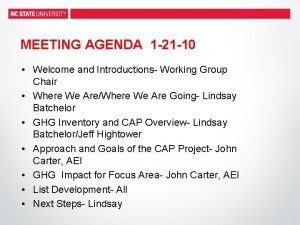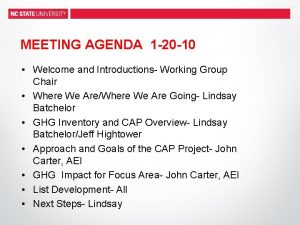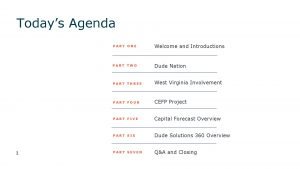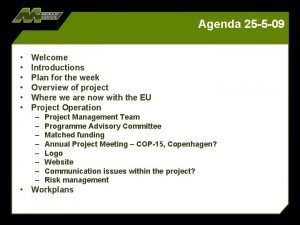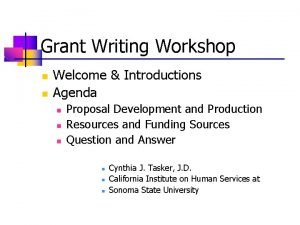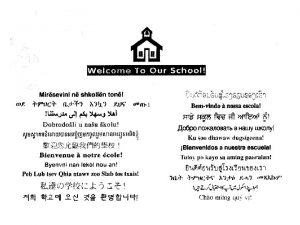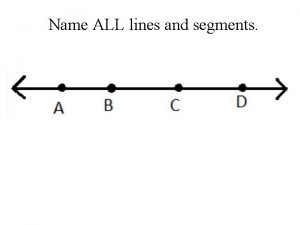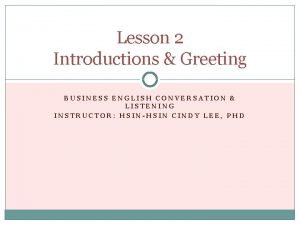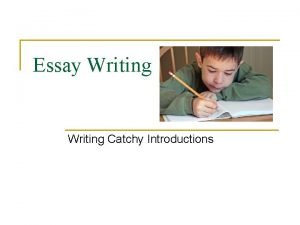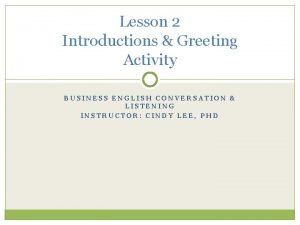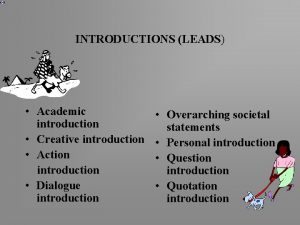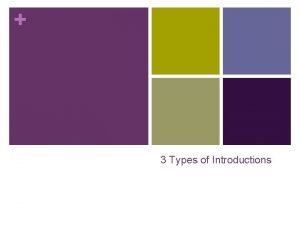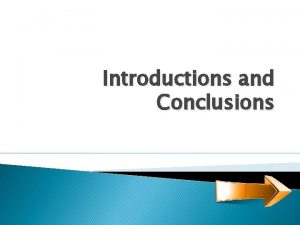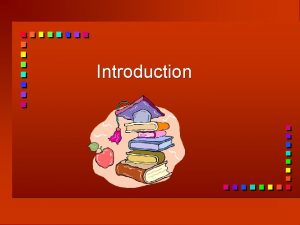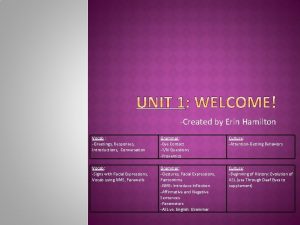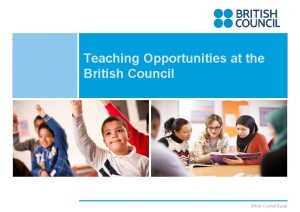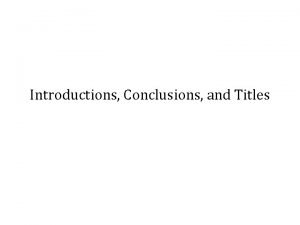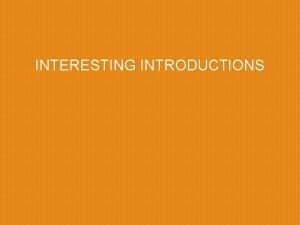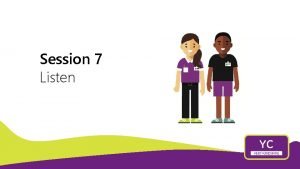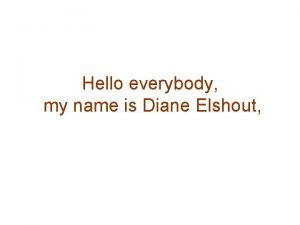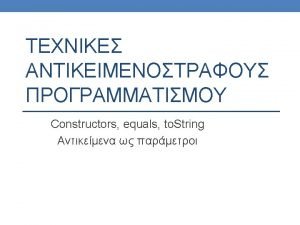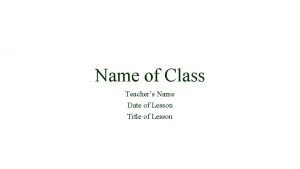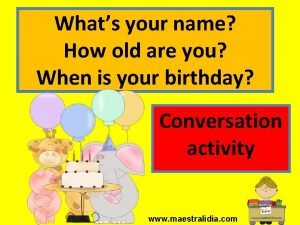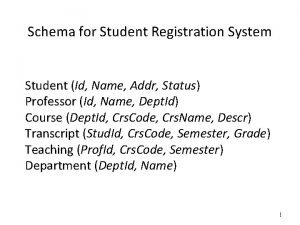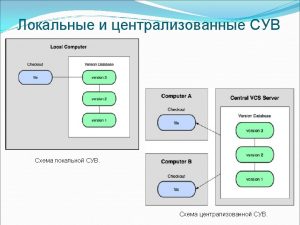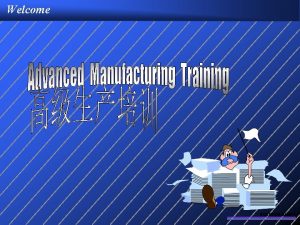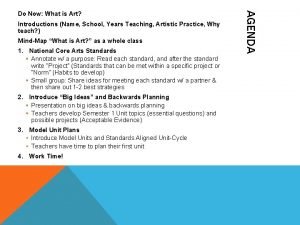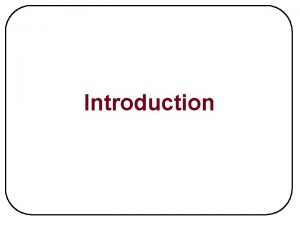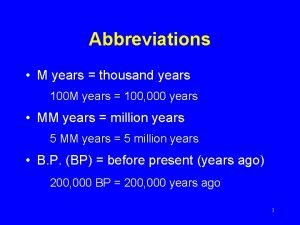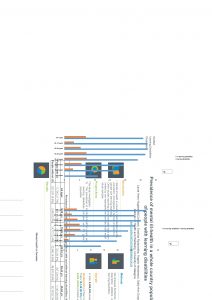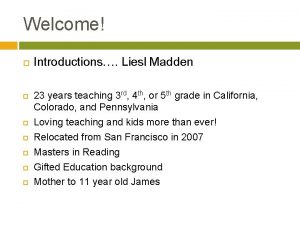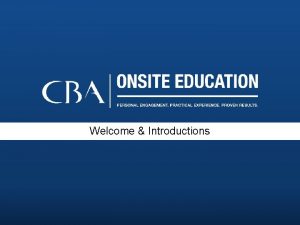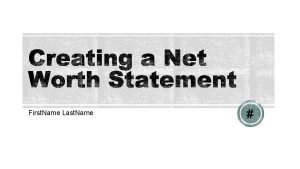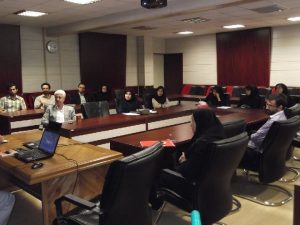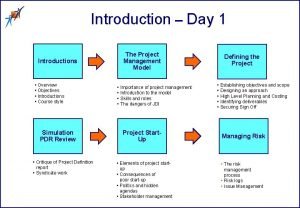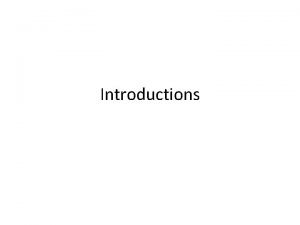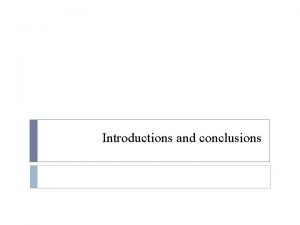Welcome To Ryle Introductions Name ContentRole Years In



















































- Slides: 51

Welcome To Ryle

Introductions • Name, Content/Role, Years In Education, Family, Book

Mastery Learning and PBIS • Madeline Hunter's method of direct instruction, generally referred to as the Madeline Hunter Method, includes seven elements: objectives; standards; anticipatory set; teaching; guided practice; closure; and independent practice. Read more: http: //education. stateuniversity. com/pages/2074/Hunter-Madeline-Cheek-1916 -1994. html#ixzz 0 Lo 7 Akk. UY • • Foster Relationships Positive and Fun Feeling Tone Teacher Enthusiasm Structure - Routines/Procedures

Staff/Student Relationships Positive Structure Interactions for Success

Three Things To Consider When Designing Your Classroom Management Plan 1. Your Style 1. The Needs Of Your Students 1. What The Effective Schools Research Says

Historical Perspective BEHAVIOR MANAGEMENT HAS TYPICALLY CONSISTED OF TRYING TO “MAKE” STUDENTS BEHAVE “You can’t make me!” ▪ This attitude leads to an overdependence on REACTIVE PROCEDURES. ▪ REACTIVE PROCEDURES are not wrong, they are simply ineffective in changing behavior. ▪ They make us “hold onto” SIMPLE SOLUTIONS!

SIMPLE SOLUTION #1: An Increase in Emotional Intensity • “Tough Kids” will ALWAYS raise you one on the emotional scale! • The trick is to NOT “join in” the escalation cycle with the student • Instead…DISENGAGE! “First you deal with the moment…Then you deal with the behavior!”

Don’t Wrestle with Pigs • It’s Dirty • And the Pigs Have Fun!!!

SIMPLE SOLUTION # 2 An Over-Reliance of “Role-Bound” Authority • “Role-Bound” power is not enough. • We tend to think that the person with the most “power” can MAKE THE KID STOP. – “It worked with me…” – “It works with most of my students. ” • Many of our toughest students just don’t get (or have never been taught) this “SYMBOLIC POWER” of authority We are the ones that end up most frustrated, because traditional discipline strategies leave us feeling powerless and ineffective!

SIMPLE SOLUTION #3: An Over-Reliance on PUNISHMENT WHY DO WE OVER-RELY ON PUNISHMENT? • • It’s quick! It’s easy to administer! It’s CHEAP! It works!!! – with students without challenging behaviors (80 -95%) Maag, J. W. (2001). Rewarded by punishment: Reflections on the disuse of positive reinforcement in schools. Exceptional Children, 67, 173 -186.

SIMPLE SOLUTION #3: An Over-Reliance On PUNISHMENT • When it doesn’t work, we fall into punishing… • More harshly • More quickly • Over longer periods of time • With more emotional intensity “YOU CAN’T MAKE ME!” TO MAKE THESE STUDENTS BEHAVE!

SIMPLE SOLUTION # 4: and Hoping are not enough! Wishing • “I hear they’re moving…” • “The year ends soon and he will just move on…” • “You know, I heard they really don’t live in our district!” • “Oh, please let her be absent just one day!”

Why doesn’t EMOTIONAL INTENSITY and PUNISHMENT work with ALL students? Reinforcement and Punishment: Function Over Form Reinforcement and Punishment are not “things, ” they are “effects. ” • Effects are to either increase or decrease behavior. • Oxymoronic: “I’ve tried positive reinforcement, and it doesn’t work. ” Maag, J. W. (2001). Rewarded by punishment: Reflections on the disuse of positive reinforcement in schools. Exceptional Children, 67, 173 -186.

What is Positive Behavior Interventions & Support? ● School-wide PBIS: A systems approach for establishing the social culture ● Evidence-based features of SW-PBS and individualized behavioral supports needed for schools to achieve both social and academic success for all students. ● Prevention ● Define and teach positive social expectations ● Acknowledge positive behavior ● Arrange consistent consequences for problem behavior ● On-going collection and use of data for decision-making ● Continuum of intensive, individual interventions. ● Administrative leadership – Team-based implementation (Systems that support effective practices)

SCHOOL-WIDE POSITIVE BEHAVIOR SUPPORT ~5% ~15% Primary Prevention: School-/Classroom. Wide Systems for All Students, Staff, & Settings ~80% of Students Tertiary Prevention: Specialized Individualized Systems for Students with High-Risk Behavior Secondary Prevention: Specialized Group Systems for Students with At-Risk Behavior

Ryle’s Tiers

Behavior Data - Most common reason for discipline referral? - Late for Class/Late Arrival/Skip – 50% - Most common grade level referred? - 9 th with 38% - What % of referrals do our top ten most referred students make up? - 19%

RHS School-Wide Expectations

Expectations Are Applied Ryle High School Behavioral Expectations T SCHOOLWIDE Res pect ∙ Treat others with kindness, acceptance, and humility ∙ ∙ ∙ Serv ice ∙ ∙ Inte grity ∙ ∙ ∙ A HALLWAYS ∙ ∙ ∙ Res pon sibil ity R Keep hands to self Move quickly and quietly through halls Be courteous/kind D I T I O N COMMONS/ CAFETERIA ∙ RESTROOM Show appreciation for servers Be patient while waiting Show good manners ∙ ∙ ∙ Maintain personal space Use facilities properly Put trash in appropriate location ∙ ∙ Park in assigned spots Follow all appropriate traffic rules Carry hall pass at all times ∙ Remain quiet during class time ∙ Use your own locker/lock ∙ Avoid stopping in groups in the hallway Throw your trash in garbage Clean your space Remain in designated area ∙ ∙ ∙ Flush Toilet Wash hands Use trashcans when appropriate ∙ ∙ ∙ Follow entry/exit procedures Maintain safe speed Display parking pass ∙ Take turns when entering and exiting lot ∙ ∙ Report violations Only drive with appropriate permit ∙ ∙ Honor your commitments Take initiative in your school work Maintain your obligation by keeping all school facilities clean ∙ ∙ Always seek to help others Assist others when necessary ∙ ∙ Help those in need Keep hallways clear ∙ ∙ Assist others Keep area clean ∙ Walk away from trouble and report it Do what is right by avoiding gossip Be honest and trustworthy ∙ ∙ ∙ Report bullying Utilize lockers properly Treat school property appropriately ∙ ∙ Report theft Wait for your turn ∙ ∙ ∙ PARKING LOT Report misuse of the facilities

Universal Tier I PBIS Expectations • How can I implement PBIS in my room? • Teach the SWE (lesson plans provided) • • Pg. 43 of Faculty Handbook and PBIS Manual Incorporate SWE in daily procedures, routines, syllabi, rules, etc. Reinforce positive behavior by regularly distributing Positive Referrals and Raider Reward Cards Refer students to Tier II for academic or behavior Celebrate Successes (however small they are) Reinforce announcements and weekly themes Promote daily messages http: //www. projectwisdom. com/ERS/Plan. Ahead_SECOND. asp Talk about core values – as much as possible

Positive Reinforcement GOAL: Every student in your first period class gets at least one!!!

Positive Reinforcement

Define the Term STOIC is an adjective meaning “tending to remain unemotional, especially showing admirable patience and endurance in the face of adversity. ” 23

STOIC represents five variables you can experiment with to try to guide students toward the goal of respectful, responsible, motivated behavior. S Structure T Teach expectations O Observe I Interact positively C Correct fluently 24

1. Structure (organize) your classroom to prevent misbehavior. • The way a setting is structured has a big impact on the behavior and attitude of people in that setting. • An example—a setting that accomplishes an amazing feat 25

A few school-based examples: • Organization of cafeteria, playgrounds, halls • Teacher clarity • Teacher enthusiasm • Schedule of activities • Quality of curriculum • Classroom climate • Syllabi Examples 26

2. Teach your expectations regarding how to be successful within the structure that you have created. Examples…. ? 27

3. Observe whether students are meeting expectations (monitor!). • In the short run, this means circulate and visually scan. • In the long run, this means collect and analyze meaningful data on student progress. 28

4. Interact positively with students. • Provide frequent non-contingent attention to build relationships. • Provide frequent, age-appropriate positive feedback to acknowledge students’ effort to be successful. 29

5. Correct misbehavior fluently (briefly, calmly, consistently, immediately, and (as much as possible) privately). • Brief corrections maintain instructional flow and reduce the degree of disruption the misbehavior causes. • Calm corrections model responsible ways to deal with conflict, avoid escalating emotional intensity, and keep your blood pressure at reasonable levels. 30

• Consistent corrections allow you to be on “automatic pilot” and demonstrate to students you are fair and equitable. • Immediate corrections prevent minor misbehavior from becoming major misbehavior. • Reasonably private corrections model respect and help maintain the student’s dignity—while still addressing the problem. 31

Classroom management is a journey we take with our students. • The students who are motivated and responsible are like crew members; • the students who are responsible, but not terribly motivated, are like passengers; • and Huck Finn is our hostage. 32

What is Good Classroom Management? • Establish Clear Expectations in the classroom the first week of school. • Be consistent in handling all situations. • Exhibit Positive Expectations to ALL students. • Build relationships with students. • Engage students in being life-long learners.

Larry A. Ryle Discipline Program • Expectations of students are consistent among all faculty and staff. • Be proactive! Try to prevent the mess rather than waiting to clean it up.

• • Be Visible in classroom and hallways. Build relationships with students. Challenge the students academically. Our students are not finished products, they will make mistakes. Be compassionate and understanding as you teach and mold them.

Administrative Process • Students are divided by alphabet. – Last name: A-G- Mrs. Brendel/Mrs. Coleman – Last name: H-O-Mr. Shafer/Mr. Arkenberg – Last name: P-Z- Mr. Dusing/Mrs. Schilling – Mr. Ryan/Mr. Pastura– A-Z as needed

Office V/S Classroom Managed?

Discipline Referrals • Do’s –Stick to the facts –Give previous contacts with parents/student –Document all problems and incidents. If you do not document, it did not happen

Discipline Referrals • Do NOT –Write demands on what should be done –Write personal remarks –Write emotional statements –Expect that writing a referral will be the savior in regards to classroom behavior

Code of Conduct • Boone County Code of Conduct Book • Larry A. Ryle Student Agenda • Boone County Behavior Guidelines –TIER I, III

Detention • Only an administrator at Larry A. Ryle High School may assign school detention. • Detention meets Monday, Tuesday, Wednesday, and Thursday from 2: 30 p. m. until 3: 15 p. m. • Twenty-four (24) hour notice is given to the student prior to the assigned detention. • Teachers may assign their own detention and shall provide written record to student/parent of date of detention. If teacher detention is assigned, the teacher is individually responsible for supervising.

Friday School/ISS • Friday Alternative Suspension Program provides a constructive and meaningful alternative to the standard out-of-school suspension. It may also offer an opportunity for students whose grades are in jeopardy, to concentrate on their academics under the supervision of a certified teacher. • Hours are 2: 30 -6: 15 pm

Tardies to Class • Handle first four violations within your classroom. (two warning, two detentions) • On fifth violation, refer to administrator and document previous actions

Hall Passes • Students are not permitted in the hallways during instructional time unless they are accompanied by their own student agenda signed by teacher.

Academic Support Process • Teacher Expectation: – Personal communication with parent and student – Recommend student to workshops – Assign workshops for failing students or those with academic deficiencies – Parent contact to all students failing class at progress report or end of quarter – Refer Student to Tier II Team

Enhancement Program • Students who fail for a quarter, semester or year are provided an opportunity to earn a passing score. This is done using our Compass program or our Project Based recovery program. Students who successfully complete earn a 70% for that class.

I’ve come to the frightening conclusion that I am the decisive element in the classroom. It’s my personal approach that creates the climate. It’s my daily mood that makes the weather. As a teacher, I possess a tremendous power to make a child’s life miserable or joyous. I can be a tool for torture or an instrument of inspiration. I can humiliate or humor, hurt or heal. In all situations it is my response that decides whether a crisis will be escalated or deescalated and a child humanized or dehumanized. Haim Ginott 47

Marigold

New Teacher Mentoring Program • RHS is dedicated to providing a proactive and supportive environment to all employees new to the building. To this end, each new teacher will be paired with Mr. Butch Hamm, Instructional Coach, who will meet with you at least quarterly to discuss specific topics and share ideas. • New Teachers will have the opportunity to: – – Meet at least quarterly with Mr. Hamm Receive information and resources for starting off the school year Learn about important system policies Discuss relevant topics as a group

Meeting Dates: • • * Mentoring dates have purposefully been chosen just prior to each midterm grading period. Groups may select different dates. * Mentors will provide regular updates to appropriate principal and instructional coach. August 23 rd September 13 th Possible Topics: Possible ∙ Attendance. Topics: Tardies-Grades ∙ Grade ∙ Management & Posting Discipline ∙ Planning ∙ Available ∙ Intern Resources Choice ∙ Intern Choice ∙ RAP 2. 0 ∙ Evaluation November 15 th February 2 nd April 18 th Possible Topics: ∙ ILT Work ∙ Curriculum ∙ Needs Assessmen t ∙ Intern Choice ∙ Semester Exams Possible Topics: ∙ Renewal and Reinforce ∙ Intern Choice ∙ ∙ Intern Choice Final Exams

Welcome to Ryle! 51
 Artificial feeding definition
Artificial feeding definition Ryle rap
Ryle rap Meeting agenda welcome and introductions
Meeting agenda welcome and introductions Agenda welcome and introductions
Agenda welcome and introductions Agenda welcome and introductions
Agenda welcome and introductions Meeting agenda welcome and introductions
Meeting agenda welcome and introductions Agenda welcome and introductions
Agenda welcome and introductions Agenda welcome and introductions
Agenda welcome and introductions Meeting agenda welcome and introductions
Meeting agenda welcome and introductions Agenda welcome and introductions
Agenda welcome and introductions Agenda welcome and introductions
Agenda welcome and introductions Agenda for parent orientation
Agenda for parent orientation Agenda welcome and introductions
Agenda welcome and introductions Agenda welcome and introductions
Agenda welcome and introductions Goat years to human years
Goat years to human years 300 solar years to lunar years
300 solar years to lunar years Four score and seven years ago means
Four score and seven years ago means Name all the lines
Name all the lines Welcome welcome this is our christmas story
Welcome welcome this is our christmas story Attention grabber in essay
Attention grabber in essay Business english conversation
Business english conversation Higher persuasive essay examples
Higher persuasive essay examples German family vocabulary
German family vocabulary Survey introductions
Survey introductions Catchy introductions
Catchy introductions Business english conversation
Business english conversation Creative introductions
Creative introductions Types of introduction
Types of introduction Greetings and introductions
Greetings and introductions Introductions clip art
Introductions clip art Introductions by marsha
Introductions by marsha Asl greetings and introductions
Asl greetings and introductions British council vacancies egypt
British council vacancies egypt Society and culture pip examples
Society and culture pip examples Titles for conclusions
Titles for conclusions Interesting introductions
Interesting introductions Valeriaim of
Valeriaim of Welcome back name
Welcome back name Jocelyn kirsch
Jocelyn kirsch Authors last name first name initial
Authors last name first name initial Name above every other name
Name above every other name Rectangle pentagon hexagon
Rectangle pentagon hexagon Public class person string name
Public class person string name What is his name
What is his name Name of presentation company name
Name of presentation company name Name of presentation company name
Name of presentation company name Name class date
Name class date What is my name
What is my name Name
Name School
School Student id name department name
Student id name department name Git global username
Git global username


